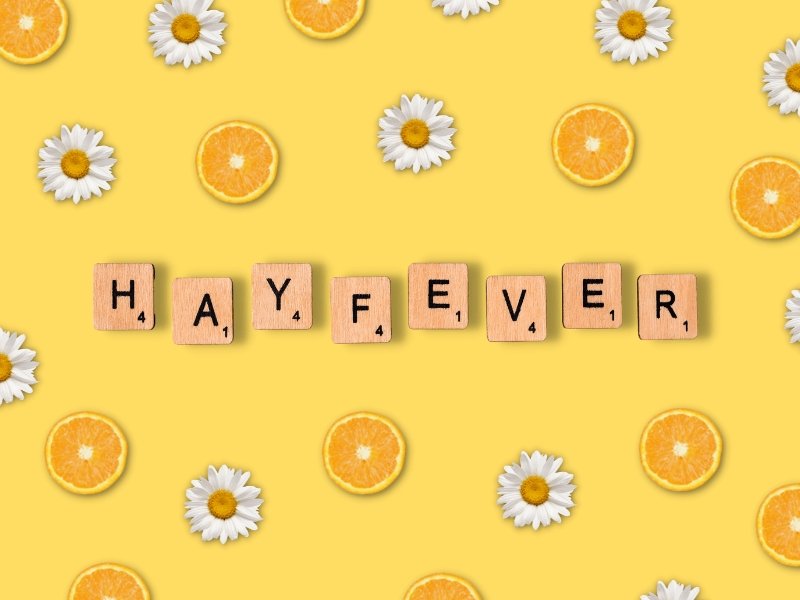It’s that time of year again where hay fever sufferers are simultaneously wanting to frolic free in the warm weather, but also wanting to stay home and hug their air purifier. In short, this time of year is the bane of existence for anyone suffering with hay fever.
Although we associate hay fever with the warmer summer months, there are in fact three pollen seasons which start from March and end in September:
- Tree pollen season tends to be from late March to mid-May.
- Grass pollen season tends to be from mid-May to July which 95% of hay fever sufferers are allergic to.
- Weed pollen season tends to be from the end of June to September.

Common symptoms include; allergic reactions, other allergy-linked problems such as eczema, asthma, dermatitis, itchy eyes, chronic nasal congestion and catarrh. These symptoms are misery-inducing for sufferers.
It can sometimes seem like there’s nothing you can do, but the good news is vitamin C can reduce your reactions, you can increase your vitamin C levels through the food you eat or supplements. It’s also possible to reduce the risk of an ‘attack’ by keeping your vitamin C levels up all year round.
Here’s how vitamin C can help your hay fever and make summer less anxiety (and hay fever) inducing for you:
Vitamin C is the most effective anti-allergy vitamin. It’s a powerful ally for a strong immune system. It works by immediately calming down allergic reactions and it’s also an anti-inflammatory.
When mast cells, that line the airways, detect pollen levels, hay fever, a common allergic reaction, occurs. Highly specialised mast cells, found in the airways, protect the body from invasive pathogens. When pollen is detected, the mast cells release a significant amount of histamine to notify the body that a potentially dangerous substance has entered.
It’s the histamine that triggers these allergic reactions to pollen. Histamine draws immune cells into the airways, to help eliminate and quickly remove the pollen from the body. Mucus is used to remove it from eyes and nose, and the lungs are cleared by sneezing. Symptoms like itchy eyes, a scratchy throat, gushing nose, and sneezing are the signs that your hay fever season is underway.

Vitamin C acts as a natural antihistamine by reducing the amount of histamine your body produces in response to an allergen. Also, thanks to vitamin C's antioxidant qualities it has the capacity to shield cells from oxidative damage. The immune cells are therefore aided in their defence against free radicals produced as a result of an allergic inflammatory response.
In a 2018 study which adopted the use of high dose 7.5 grammes IV Vitamin C, showed that it was effective in reducing effects of sleep issues, itching, and stuffy noses in adults with allergic respiratory issue. Oxidative stress appears to be a key factor in the allergic diseases, reportedly associated with reduced vitamin C plasma levels which would otherwise help prevent excessive inflammation.
IV is obviously not practical as it is both expensive and inconvenient, so one should look to other ways to increase your vitamin C intake. Food is obviously key. Eating plenty of fresh fruit and vegetables high in vitamin C regularly throughout the day would increase levels. Although, you’d still have to eat copious amounts. For example:
- 100g of strawberries 60mg
- 100g of broccoli contains 110mg
- 100g kiwi fruit 98mg
- 100g guava 228mg
- 100g of peppers contains about 100mg
And this can be affected by the freshness of the fruit and vegetables as well. However, it’s still good to eat these foods because they can also contain antioxidants such as hesperidin, rutin and quercetin.
Vitamin C supplementation is also another source for increasing Vitamin C levels. Most oral forms of Vitamin C supplements contain between 250 to 1000mg. The problem with standard capsule, tablet or powder forms is that your body regulates vitamin C intake over and above 200mg, significantly reducing absorption above this amount.
When looking for vitamin C supplements, you need one that is fast-absorbing and offers superior absorption rates, so you know you’re getting the full benefits. Well.Actually. High-Strength Liposomal Vitamin C (1000mg) with enhanced absorption, works fast to boost Vitamin C levels in the body, optimising its immune, antioxidant, collagen, energy and bone support capabilities.
If you’re suffering from hay fever, you may want to take twice this amount daily. Since the majority of vitamin C leaves the body within 6-8 hours of ingestion, it’s best taken throughout the day (i.e. in two 1,000mg doses) to keep your levels up consistently. This can be done as either 1g in the morning and 1g at lunch. You may even want to consider taking it three times a day to help reduce mild symptoms like sneezing, runny nose, congestion, and watery eyes due to allergic reactions.
If you liked this article, make sure you share it on social media so we can reach other hay fever sufferers.





